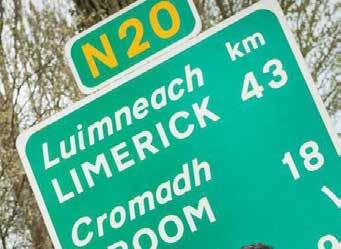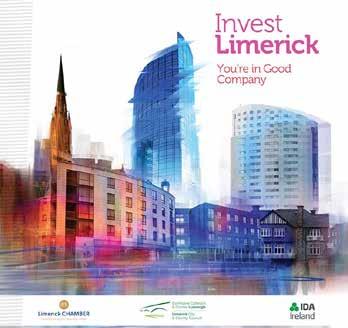
2 minute read
Connect Limerick: M20
A Transport Corridor for the Future
Making greener choices, from driving less to cycling more, is at the top of everyone’s minds these days, and with those priorities gaining traction, adding more roads has slipped lower on the list. But as Chamber members know, roads are still vital to building a geographically balanced economy that helps attract and retain investment.
That’s why the M/N20 transport corridor has remained a focus for Limerick Chamber, who worked with Cork Chamber to have the project included in the National Development Plan.
“There’s often a complexity in emphasising the need for roads, while at the same time supporting climate goals, compact growth, and sustainability,” explained Dee Ryan, CEO of Limerick Chamber, “It is important for us that the M/N20 update will be future-proofed to increase sustainability and support the economic viability of the region.” Ryan confirmed, “This is not going to be a traditional motorway.”
Improving the current N20 route to decrease drive times and increase safety between the country’s second and third largest cities is a key focus for Chamber members. Upgrading the N20 to a motorway would deliver improved capacity for both regional and international trading, completing the corridor along the western seaboard and improving opportunities for trade and tourism. When the Chamber undertook the Indecon study of its viability in 2017, the current N20 route was already operating at 120% capacity. While the COVID-19 pandemic has no doubt brought traffic down temporarily, the road remains in dire need of both safety and capacity upgrades. Regional connectivity remains a key focus in the Chamber’s efforts to ensure the M/N20 transport corridor is brought to fruition through the National Development Plan. The proposed motorway will bring Cork, Limerick and Galway closer together, supporting between 4,000-4,500 jobs in the area, and driving up to €128 million in revenue per year.
The IDA echoed these sentiments in their February 2021 submission to the review of the National Development Plan that “the proposed M20 will enable economic synergies to be realised between the clusters of FDI clients in Cork and Limerick,” helping to achieve their – and our – goal of supporting existing and future indigenous and overseas businesses in the region. While many of the elements of the M/N20 motorway of the future have been set in place, the railway and road connection to the port of Foynes has not yet been nailed down. This will be a key component, especially if and when projects like floating offshore wind are developed.
Concentrating on sustainability has allowed developers to envision a transport corridor that will be future-proofed, and that will not only help goods, services and people move throughout the region more efficiently, but will also help travellers reduce dependency on cars.
The Chamber continues to lobby to ensure the motorway is supported by bus and cycling infrastructure, as well as complemented by a greenway that connects Limerick to Cork, which will help draw increased holiday-makers to the area. Additionally, the M/N20 motorway will be able to support the expected rise in electric vehicles, with regular charging points, as well as the autonomous vehicles that are anticipated in coming years.
The M20 is a key piece of infrastructure to connect Irelands second and third cities and to support the development of an effective counter-balance to Dublin
– Donnacha Hurley, Limerick Chamber President.











